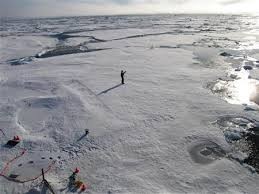Arctic sea has shrunk to historic low on Feb. 25 which was the minimum seasonal extent recorded by The National Snow and Ice Data Center (NSIDC).
The conditions were totally different from the past several years. According to the NSIDC, the ice sheet covered 15.54 million square kilometres (approximately 5.6 miles). The NSIDC is a part of the Cooperative Institute for Research in Environmental Sciences at the University of Colorado Boulder.
This study shows a decline of nearly 1.1 million square kilometers in comparison with 1981. The extent of Arctic came 15 days earlier as planned, reported by Fox News U.N. Climate team has calculated that the Arctic sea is shrinking at a rate of 3.8 percent per year, this means that within the next half century there wouldn't be an icy sea for the summers.
Norwegian Polar Institute expert Sebastian Gerald told Reuters, "The majority of models point in the same direction - less ice."
Researchers say that this may be caused due to the warm conditions in Russia and Alaska. Experts of the NSIDC are still hopeful for a late season ice growth and have delayed the final update till April.
Another question raised is the possibility that this might be caused due to the extensive global warming which has caused an increase in ocean and atmospheric temperatures. The ice is really important for maintaining the temperature of the sea as it reflects the sun rays which stops it from heating faster.
The reduction in Ice will lead to a warmer Arctic which will devastating effects on the ecology of the whole globe. There are chances that we might face an increased number of natural disasters such as Tornado and Floods.



























